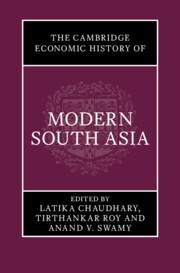Refine listing
Actions for selected content:
1299800 results in Books
Advances in Material Science and Applications
- Bulk (Silicon) vs Nano (Graphene)
- Coming soon
-
- Expected online publication date:
- February 2026
- Print publication:
- 01 May 2027
-
- Book
- Export citation

Human Flourishing and the Firm
- Virtue, Strategy, and Deliberation
- Coming soon
-
- Expected online publication date:
- February 2026
- Print publication:
- 28 February 2026
-
- Book
- Export citation

The Cambridge Companion to Rammohun Roy
- Coming soon
-
- Expected online publication date:
- February 2026
- Print publication:
- 01 May 2027
-
- Book
- Export citation
Becoming Allies
- Civil Liberties Activism in India
- Coming soon
-
- Expected online publication date:
- February 2026
- Print publication:
- 30 April 2026
-
- Book
- Export citation
The Cambridge Companion to Indian Politics and Society
- Coming soon
-
- Expected online publication date:
- February 2026
- Print publication:
- 01 May 2027
-
- Book
- Export citation
Making Sense of the University
- A Manifesto for our Times
- Coming soon
-
- Expected online publication date:
- February 2026
- Print publication:
- 01 May 2027
-
- Book
- Export citation
Islamic Intellectual History in the Mughal World
- Coming soon
-
- Expected online publication date:
- February 2026
- Print publication:
- 01 May 2027
-
- Book
- Export citation
The Fundamentals of Indian Contract Law
- Coming soon
-
- Expected online publication date:
- February 2026
- Print publication:
- 30 April 2026
-
- Book
- Export citation
Causal Mediation Analysis
- Coming soon
-
- Expected online publication date:
- February 2026
- Print publication:
- 28 February 2026
-
- Book
- Export citation

Textual Genealogies and Shakespeare's History Plays
- Coming soon
-
- Expected online publication date:
- February 2026
- Print publication:
- 28 February 2026
-
- Element
- Export citation

Unwilling To Know
- Male Homosexuality at the Crossroads of Europe, 1870–1965
- Coming soon
-
- Expected online publication date:
- February 2026
- Print publication:
- 28 February 2026
-
- Book
- Export citation

The Cambridge Economic History of Modern South Asia
- Coming soon
-
- Expected online publication date:
- February 2026
- Print publication:
- 28 February 2026
-
- Book
- Export citation

Nursing Aids at War
- The Australian Army Medical Women's Service in the Second World War
- Coming soon
-
- Expected online publication date:
- February 2026
- Print publication:
- 28 February 2026
-
- Book
- Export citation
Antiquity Made Present in Reformation England
- Classical Translation and the Politics of Counsel, 1530–1580
- Coming soon
-
- Expected online publication date:
- February 2026
- Print publication:
- 28 February 2026
-
- Book
- Export citation

Power Over Progress
- How Politics Shape Development Finance in Africa
- Coming soon
-
- Expected online publication date:
- February 2026
- Print publication:
- 28 February 2026
-
- Book
- Export citation

Augustine's Theology of Justification by Faith
- Coming soon
-
- Expected online publication date:
- February 2026
- Print publication:
- 28 February 2026
-
- Book
- Export citation
Varieties of Peripheral Growth Models
- Towards a New Comparative Political Economy of Development
- Coming soon
-
- Expected online publication date:
- February 2026
- Print publication:
- 28 February 2026
-
- Element
- Export citation

Opera Remixed
- Coming soon
-
- Expected online publication date:
- February 2026
- Print publication:
- 28 February 2026
-
- Element
- Export citation

Computability and Computational Explanation
- Coming soon
-
- Expected online publication date:
- February 2026
- Print publication:
- 28 February 2026
-
- Element
- Export citation

Formal Methods, Informally
- How to Write Programs That Work
- Coming soon
-
- Expected online publication date:
- February 2026
- Print publication:
- 31 January 2026
-
- Textbook
- Export citation
